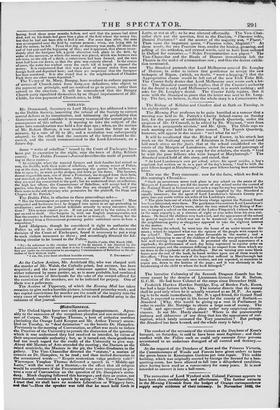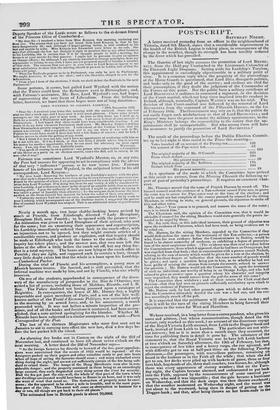The connexion of Lord Wynford with Colonel Fairman appears to
have been close, confidential, and affectionate. The further extracts in the Morning CAronick from the budget of Orange correspondence supply ample evidence of their intimacy. In November 1832, the
Deputy Speaker of the Lords wrote as follows to the ci-devant friend of the Princess Olive of Cumberland-
.' My dear Sir—I received a letter from Miss Kenyon this morning, enclosing one from you. The reason that you have not heard from Lord Kenyon is, that he has been dangerously ill; and although (I hope) getting better, is still confined to his bed and unable to write. Miss Kenyon has forwarded your letter to me safe. She says that although she has not thought it right to mention this or any other business to his Lordship, she is certain that if it be thought proper to hold a meeting, his house is at your service for that purpose. I ought nut to presume to give an opinion on Orange affairs ; for although I am sincerely attached to Orange principles, from my repugnance to belong to any club, I have nut yet proposed myself to become a member of that club. The reasons that you give in your letter to Lord Kenyon appear to me swat satisfsctory to show that the meeting should at present be holden, but of that the Duke will judge.
"What the Radicals propose to do in Parliament, can only be met in Parliament. 'We ought, however, to be on the alert ; and I am, therefore, obliged to you fur the Information.
" From what I hear of the elections, I think we shall defeat the Radicals in the next Parliament."
Some persons, it seems, had gulled Lord Wynford with the notion that the Tories could beat the Reformers even in Birmingham ; and, with Fairman's assistance, Mr. Best, Lord Wynford's son, had hopes of representing the very focus of Liberalism. From the following letter, however, we learn that these hopes were not of long duration— LORD WYNFORD TO COLONEL FA1RMAN.
" 29th November 1832.
" Dear Sir—I received your letter this morning with the enclosed. Soule out' has sent me this a week ago, and I have read it with great pleasure. 1 have some friends coming to me the early part of next week. As soon its they leave me, 1 shall go to Bath tor a month. if Parliament will permit me. I am sot ry to hear of your account of Birmingham. I had hoped that there would have been considerable react ion. I ant ready to do my duty whenever Pailiameut shall meet. Mr. Horsley Palmer's retiring from Birmingham greatly surprises me. 1 understood, at the Carlton Club, that his return was certain. had a requisition teen seat to my son when it was sent to Mr. Palmer lie would have stood if there hail been a fair chance of success ; and he had, I believe, nerves to abide the pelting of any storm. " But I think it is now toe late, and I have no opportunity of conferring with him as be is not with me. III do, I think, at this late hour, I should advise him to reserve his.money fur another opportunity, when he can meet his advelsary on more equal terms. I am, my dear Sir, very faithfully yours, WYNFORD.
"
You speak of coming in on a petition : any person who comes before a Committee of the House as a party on an election contest, under the Bill, will le ruined, be the ease what it Fairman was sometimes Lord Wynford's Mentor, or, at any rate, the Peer had reasons for appearing to act in compliance with the advice of that very " indiscreet" person, as be now terms him. Faint-ion boasts of his influence over Wynford, in the subjoined letter to his old
correspondent, Lord Kenyon-
" My dear Lord—Knowing the kindness of your Lordship's nature, a ith the plea- sure that such a disposition must derive from seeing its own favourable impressions con. armed by the opinions of others. 1 am prompted to forward for your Lordship's perusal, a letter from Lord Wynford. !fin d • g this there be any vanity, it sill he considered your Lordship, I am well assured, more in the slizpe of an amiable foible than as an oser- weening pride. Upon the authority of Swift, indeed. I might be justified in saying it was rather a proof or humility tlum otherwise ; fin the arrogant deem honour the must exalted, as the Dean himself has insisted, far below the value of their own merits.
"Unless my memory lead me into an error, in a communication that I lately made to your Lordship, which accompanied one of the libellous tracts. I suggested the precise line of conduct Lord Wynford has adopted. This is an additional source of gratification to me."



























 Previous page
Previous page